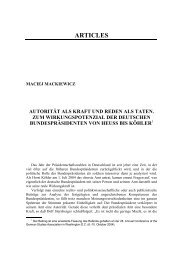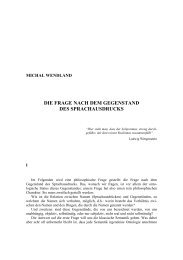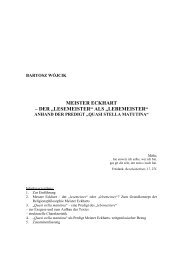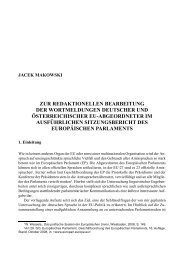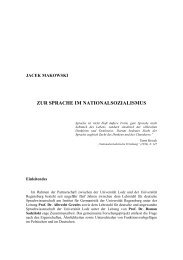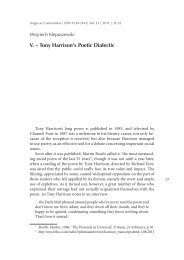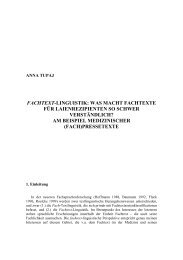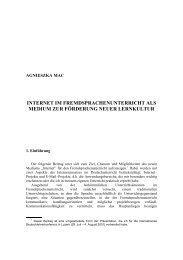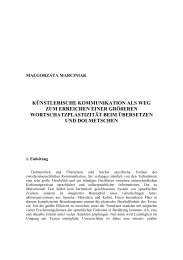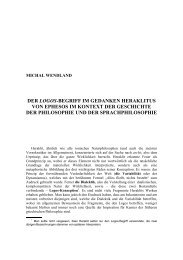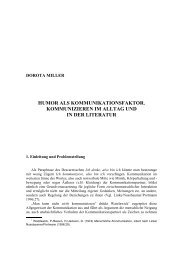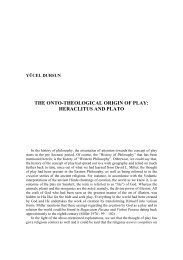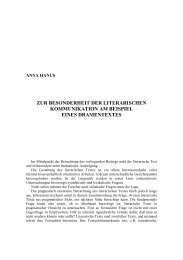ENGLISH ÃœBER ALLES : ANGLO-AMERICANISMS IN THE ...
ENGLISH ÃœBER ALLES : ANGLO-AMERICANISMS IN THE ...
ENGLISH ÃœBER ALLES : ANGLO-AMERICANISMS IN THE ...
Create successful ePaper yourself
Turn your PDF publications into a flip-book with our unique Google optimized e-Paper software.
K<strong>IN</strong>GA NETTMANN-MULTANOWSKA<br />
<strong>ENGLISH</strong> ÜBER <strong>ALLES</strong> 1 : <strong>ANGLO</strong>-<strong>AMERICANISMS</strong><br />
<strong>IN</strong> <strong>THE</strong> GERMAN LANGUAGE AFTER <strong>THE</strong> YEAR 1945<br />
1. Introduction<br />
It takes little linguistic training to notice that of all the world languages it is the English<br />
language that plays the major international role at the beginning of the third millennium<br />
AD.<br />
There has never been a language so widely spread or spoken by so many people<br />
as English (Crystal 1997:139).<br />
No language has ever before been put to so many uses so massively by so many<br />
people in so many places--on every continent and in every sea; in the air and in<br />
space; in thought, speech, and writing; in print on paper and screen, in sound on<br />
1 The title ‘English über Alles’ originates from E. von Lowenstern article published in The New<br />
York Times Nov. 9, 1990, p. 35 where mocking the wide-spread usage of Anglicisms, he proves that<br />
it is possible to write an article in the German language minimizing the usage of German vocabulary<br />
[see Appendix].
26<br />
Kinga Nettmann-Multanowska<br />
tape and film; by radio, television, and telephone, and via electronic networks and<br />
multimedia ... It is used by over a billion of people (McArthur 1998:30).<br />
The popularity and omnipresence of English is beyond dispute, but what has been the<br />
topic of many linguistic debates, apart from its actual status and the way it is labeled<br />
today ('international', 'world', or 'global'), is the nature and scope of its influence upon<br />
other ('recipient') languages.<br />
This article briefly discusses several issues related to the problem of English language<br />
intrusion into the German lexicon after the year 1945, namely (1) the puzzling<br />
question of the source language of the new lexical material (American or British English),<br />
(2) the treatment of Anglo-Americanisms 2 in both former German republics, (3)<br />
motives for the extensive usage of English word material in modern German, and finally,<br />
(4) the difficulties ordinary users may face while implementing the borrowings into their<br />
lexicon.<br />
2. Source language dilemma: a summary of British-German and American-<br />
-German postwar linguistic encounters<br />
Anglo-Americanisms in German have always drawn notable attention from linguists,<br />
who generally agree that whereas England's geographical proximity and leading role in<br />
trade and commerce set the stage for British-German contact in the 19th century, the<br />
20th century has witnessed the rising predominance of American English by virtue of its<br />
role as an international superpower. One of the first audible comments about the ongoing<br />
transition from Br.E. to Am.E. influence comes from Carstensen (1967b:13) "... daß das<br />
AE heute das BE in seiner Bedeutung weiter und weiter zurückdrängt, ist kein<br />
Geheimnis und keine Vermutung mehr."<br />
Br.E. and Am.E. are present in today's German, but the scale of transference from<br />
Anglo-American reality has been different with respect to both former East and West<br />
German varieties, and it has been an obvious consequence of postwar political and<br />
cultural developments. 3<br />
2.1. Anglo-Americanisms in the FRG 4<br />
In the FRG the period of intensive postwar contact was started with the presence of<br />
American and British troops in two out of the four occupation zones. 5 The Marshall Plan,<br />
with active US economic and technological assistance, further contributed to the Am.E.<br />
2<br />
In this paper the terms 'Anglo-Americanisms' and 'Anglicisms' are used interchangeably.<br />
3<br />
For details see Galinsky (1991), Clyne (1997a).<br />
4<br />
A concise historical sketch of Anglo-American contacts with the German language in W. Viereck<br />
(1986b).<br />
5<br />
With the American zone the largest of the four.
English über alles 27<br />
influence upon the West German language. On top of that, economic, political and<br />
strategic pacts and alliances introduced Germany to international cooperation and communication<br />
and opened its way to the world's supranational tendencies and movements<br />
in the arts, youth culture, etc. The West German Americanmania that dominated all<br />
aspects of life was manifested in all possible forms: from English-language (Am.E. in<br />
particular) newspapers and magazines being readily available, to pop songs and cable<br />
television (CNN live), to comics, consumer goods, or advertising techniques, to name<br />
just a few. Such massive exposure to English (Am.E. in particular) resulted in massive<br />
transference of items 6 ; transference that operated at all levels. 7<br />
There has been a steady flow of English loan-words into German since as early as<br />
the thirteenth century. Yet a dramatic change occurred after 1945 when the practice<br />
of borrowing from English became so strong that some people were<br />
prompted to say that German had become a mixed language, much like Franglais<br />
(a mixture of French and English), the result of which is called Denglisch,<br />
Engleutsch, Gerglish, Deuglish or Anglodeutsch and is plagued with what Perkins<br />
(1977) calls the 'English sickness'. Although this might well be a gross exaggeration,<br />
there is no doubt that the influence of English is a determining factor in present-day<br />
German (Carstensen 1983:13).<br />
Am. E. as a source language is made obvious by words depicting typical and USAonly<br />
realia or items retaining a typically American spelling, but in many cases the<br />
Br./Am. E. source language dilemma is insoluble.<br />
In many cases ... one can no longer furnish exact evidence: expressions which<br />
may have come into being in American English can a day later already be a part<br />
of British English (and vice versa), or even be an accepted part of the English<br />
language as a whole (Viereck and Bald 1986a:III).<br />
It happens very often that even native speakers of English, when confronted with neologisms<br />
of Anglo-American origin, tend to give contradictory answers as to whether<br />
a given item can be attributed British or American origin (W.Viereck 1986b:121). 8<br />
6 Galinsky (1980; also 1991) shows that the process of adopting English lexical items (from British,<br />
American, Canadian, or New Zealand English) is a complex phenomenon. The speed with which<br />
the German language creates its replica word depends on numerous factors, such as ethnolectal<br />
channels of transference and areas of primary and secondary distribution. The conclusions are that<br />
some neologisms get assimilated immediately, while the reception of others can take anything from<br />
one to 3 years, or longer (28 (!) years in extreme cases).<br />
7 Many English loans belonging to specialist jargon have also found their way from there into the<br />
mainstream of the German vocabulary, e.g. ‘splitting’ (separate assessment of half of the joint<br />
income of a husband and wife for taxation purposes).<br />
8 "It would certainly be welcome if it were possible to determine and delimit both quantitatively<br />
and qualitatively the influence of AE as against Briticisms. This however is no longer possible even<br />
to those thoroughly conversant with both branches of the language."
28<br />
2.2. Anglo-Americanisms in the GDR 9<br />
Kinga Nettmann-Multanowska<br />
Contrary to its western neighbor from the very beginning the linguistic policy in the<br />
GDR embarked on a course of separationism and anti-Anglo-Americanism, which<br />
reflected the general political orientation. The officially declared open-mindedness,<br />
however, favored "a good and simple language understandable to the masses" (Lehnert<br />
1986:130) without banishing foreign language use which, as in the case of English<br />
words, was a part of scientific Marxist-Leninist terminology. Many items infiltrated<br />
GDR German as a result of contacts with the western world in various spheres of life, or<br />
ordinary people's fascination with western life styles, others came from and through<br />
Russian as an intermediary language; such innovations being often a part of the official<br />
jargon of the regime.<br />
What is typical of GDR Anglo-Americanisms is the fact that, as compared with the<br />
FRG usage, they were less numerous, 10 more restricted or different in meaning than their<br />
FRG counterparts, and often with Russian as an intermediary. Words such as Dispatcher,<br />
Cocktail, Kombine, Meeting, Pressebriefing, Platform, or Festival serve as the<br />
best exemplification of the above mentioned peculiarities of GDR use of Anglicisms: for<br />
example: (1) Meeting "a political gathering"; (2) Platform "the main ideas of a political<br />
party"; (3) Cocktail "diplomatic reception"; (4) Dispatcher "a supervisor who watches<br />
and directs the sequence of operations in industry and traffic" (Lehnert 1986:143; Carstensen<br />
1984b:49). Transfers like Boss (Boß) or Manager, 11 Big Business, or Image were<br />
stigmatized with negative connotations. Moreover, entry oddities like Broiler 'roast<br />
chicken', never employed in FRG German, appeared in the German of the GDR. Moreover,<br />
many western authors, for example Clyne (1997b:125), have stressed the significant<br />
role of Sprachkultur in fighting off English influences rather than welcoming<br />
foreign vocabulary enrichment of the German lexicon.<br />
The following quotation may serve as an illustration of the controversial nature of<br />
East/West German independent studies of Anglo-Americanisms in the everyday usage of<br />
the GDR:<br />
In reply to my letter in 1971 informing Carstensen that in N.Lehnert's abovementioned<br />
study 12 some Anglo-American words had been treated which were<br />
missing in his [Carstensen's] book (1965), 13 he remarked 14 ... "that Container and<br />
Broiler have meanwhile become fixed terms in West Germany." His remark on<br />
9<br />
For more detailed treatment see Buck (1974); Kristensson (1977); Lehnert (1986); Clyne<br />
(1992), e.g.<br />
10<br />
Nevertheless, still covering similar 'topical' spheres, such as politics, technology, fashion,<br />
sport, pop music, etc.<br />
11<br />
‘Leiter’ was the accepted GDR term referring to ‘a person in charge of a company's division’.<br />
12<br />
Lehnert, Norbert. 1969. "Der Einfluß der englischen Sprache auf die Allgemeinsprache der<br />
DDR". Humboldt-Universität Berlin [term paper].<br />
13<br />
Carstensen Broder. 1965. Englische Einflüsse auf die [west] deutsche Sprache nach 1945.<br />
[Beihefte zum Jahrbuch für Amerikastudien 13]. Heidelberg: Winter.<br />
14<br />
Carstensen Broder. 1973/74. "Englisches im Deutschen: Zum Einfluß der englischen Sprache<br />
auf das heutige Deutsch". Paderborner Studies 3. p.5
English über alles 29<br />
Broiler seems rather surprising to us in view of his later statement 15 "There are<br />
also Anglicisms which only occur in the GDR (Broiler being the best-known example)".<br />
All our West German visitors did not know so far what to make of the<br />
word Broiler ... (Lehnert 1986:133).<br />
Generally speaking, the duality in the treatment of Anglicisms makes it difficult to<br />
estimate the actual Anglo-American influence on GDR German with East German<br />
linguists, subject to political pressures, dismissing transference, 16 or quite contrary,<br />
(over)emphasizing it. 17<br />
... I hope to have shown that the Anglo-American influence on the language of<br />
the GDR has by far been greater and deeper than Carstensen, at least a decade<br />
ago, supposed when he wrote: 18 "nicht eimal die DDR hat sich diesem<br />
sprachlichen Einfluß ganz entziehen können" ('not even the GDR could fully<br />
avoid this [Anglo-American] influence'). On the contrary, the GDR vies with the<br />
FRG in this field (Lehnert 1986:154).<br />
3. Why use Anglo-Americanisms: motives for the use of borrowings from<br />
English in the German language 19<br />
What are the reasons for using Anglicisms in German? A number of linguists have<br />
addressed this issue and hypothesized on the justifiable reasons in various functional<br />
areas. 20<br />
The most easily understandable motive for the borrowing of a word from a foreign<br />
language is when the actual object or concept is also imported ... der Laser,<br />
der Landrover, das Milkshake, die Public Relations. This is particularly true of<br />
certain areas of the vocabulary, e.g. pop and rock music ... , and fashion ... (Russ<br />
1992:101).<br />
Generally, as Görlach and Schröder (1985:231) put it "English has 'snob-appeal' and<br />
it is used even where German equivalents are easily available ... Listeners do not resent<br />
the use of English words even if they understand them incompletely or not at all". It is<br />
also beyond dispute that English vocabulary items used to describe activities or professions<br />
add a certain prestigious flavor. In Lehnert's (1986:145) words "to be an Enter-<br />
15<br />
Carstensen, Broder. 1980. "Englisches im Deutschen--Bericht über Planung und Vorarbeiten<br />
zu einem Anglizismen-Wörterbuch als Schwerpunkt eines Forschungsprojekts". In Herbert Grabes<br />
(ed.). Anglistentag 1980 in Gießen. Grossen-Linden. p.30.<br />
16<br />
F.C.Weiskopf; H.Becker; V.Klemperer; S.Kahn.<br />
17<br />
H.Reich; N.Lehnert; G.Kristensson.<br />
18<br />
Carstensen Broder. 1973/74. "Englisches im Deutschen: Zum Einfluß der englischen Sprache<br />
auf das heutige Deutsch". Paderborner Studies 3. p.5<br />
19<br />
Linguistic reasons for the introduction of loans discussed in Hockett (1958:404-407) and Weinreich<br />
(1970:56-61).<br />
20<br />
For details see Galinsky (1967); Pfitzner (1978); Fink (1980); Debus (1984), e.g.
30<br />
Kinga Nettmann-Multanowska<br />
tainer is a more pretentious activity than that of a mere Unterhalter. Likewise, a Schallplattenunterhalter<br />
prefers to be called Diskjockei or Disk-jockey." Anglo-American lexis<br />
is in vogue, although it forms a class of 'Imponiervokabeln' ('imposing words') (Kristensson<br />
1977:234; cf. H. Ortner 1981, and L. Ortner 1982).<br />
It seems that both the citizens of the FRG and the former GDR have long been under<br />
the spell of Anglo-American loans. Wilss (1958:184) was one of the first who enumerated<br />
a concise list of factors responsible for the spread of foreign loans in German; and<br />
since that time similar factors have been appearing and re-appearing in the listings of<br />
other authors. Wilss' inventory encompassed the following positions: (1) imitation and<br />
fascinations with the 'foreign'; (2) standardization and universality of tastes, life styles,<br />
and languages; (3) educational and snob-like marking value on the part of the potential<br />
user; (4) commercialization of language and persuasive force of foreignisms in the<br />
language of ads; (5) lexical enrichment; and finally (6) technicalization of the language.<br />
One of the first extensive attempts to categorize English word-material in German,<br />
was made in 1964 by Galinsky. 21 In his still-up-to-date categorization, 22 Galinsky came<br />
up with seven stylistic functions of Anglicisms, documented with numerous examples<br />
from various domains including the press, politics, literature, etc. The categorial functions<br />
were as follows: (1) conveying 'American color'; (2) precision; (3) intentional<br />
disguise; (4) brevity; (5) vividness; (6) tone; and (7) variation of expression.<br />
Debus (1984) emphasizes the usefulness of Anglicisms in political jargon because,<br />
thanks to vaguely defined semantic fields, they tend to be perceived as neutral, whereas<br />
their German counterparts may often evoke negative connotations, for example, E.<br />
Korruption vs. G. Bestechung (ibid., 21). Similarly, in the business language der Manager<br />
often replaces der Führer which brings negative associations 23 (Kovtun 1996:346).<br />
In science and technology, on the other hand, Anglicisms served the need for precision.<br />
24 The same 'maximum precision' principle applies in business. In his article, Fink<br />
(1980) addressed the use of English in the vast area of advertising and promotion, which<br />
he called "eines der Haupteinfallstore für Anglizismen im Deutsche" (ibid., 187). Here,<br />
according to Fink, English operates within six functional categories: (1) übersteigerte<br />
Wirkung ('exaggerated effect'); (2) Euphemismus ('euphemism'); (3) Sachlichkeit ('objectivity');<br />
(4) Textgestaltung ('text creation'); (5) Bedürfnis ('need for necessity'); and<br />
finally (6) Anbiederung ('gaining favor').<br />
A further contribution was made by K.Viereck (1986), who studied the presence of<br />
English word-material in two Austrian newspapers. Her findings contribute greatly to<br />
the discussion of functional aspects of English, especially with respect to newspaper ads.<br />
As with other similar studies, 25 it seems that general apparent tendencies are: (1) the<br />
bigger the circulation the bigger the average number of Anglicisms, and (2) the higher<br />
the assumed level of education of the reader the bigger the number of Anglo-American<br />
21 See Carstensen, B. and Galinsky, H. (1975). 3rd edition.<br />
22 Further developed by Pfitzner (1978).<br />
23 As mentioned before in the GDR both ‘Manager’ and ‘Führer’ were avoided, instead the term<br />
‘Leiter’ was used.<br />
24 For details see Carstensen (1984b:45-48); Debus (1984:21); Michels (1991); Schwarze<br />
(1991:16); Skudlik (1991).<br />
25 Other frequency studies of Anglicisms in German (or Austrian) press: Fink (1970); Engels<br />
(1976); K.Viereck et al. (1975); Bus (1980).
English über alles 31<br />
loans. But, K.Viereck reports on one more interesting phenomenon, namely, German<br />
anglicized orthography "A characteristic feature of German advertising language is its<br />
intended English appearance by means of anglicized spellings, as, for example, in<br />
exclusiv, creativ, Co-pilot, Tabac-Shop, etc." (1986:170). 26 Such spelling 'tricks' employed<br />
by advertisers are a definite motivating factor as "they increase the desire to buy<br />
a product" (ibid., 170-71). 27 On the whole, however, "Anglicisms are assigned important<br />
stylistic and expressive functions in contemporary German newspapers" (Pfitzner<br />
1978:226). 28 Also Perkins (1977:58-59) claims that "in German advertising there is a<br />
deliberate English (or American) slant, either in the names ('Irish love'--an ice cream) ...<br />
or in the descriptions ('Black Magic'--a special one-off black car series ...)." To support<br />
his opinion he gives several examples from the popular nomenclature of North German<br />
'Kneipen' ('Come in', 'Dream Pipe', 'Mister Drink's Beerhouse', etc.), where anglicized<br />
labels work as a status-marking device.<br />
4. Anglo-American transfers as sociolectal markers: how comprehensible<br />
are the Anglicisms used in the papers?<br />
Not all the native speakers welcome Anglo-American transfers with open arms because,<br />
as Carstensen (1965:20) observes, "...newspapers and magazines still make<br />
considerable demands on the reader who is familiar with the English language, and the<br />
suspicion that many subtleties of the English language are lost on the average reader<br />
persists." Therefore, the language of the press is often described pejoratively as Journalesisch<br />
(E. journalese). In Germany for a number of years Der Spiegel, modeled on<br />
Time and Newsweek, has had a reputation for coining new words and extensive use of<br />
English lexical items in the articles. Der Spiegel, known for its complex style, has<br />
always been directed towards a (highly) educated audience, which, according to the<br />
publishers, should not face any problems in decoding English saturated texts. For an<br />
average reader, however, English-German lexical encounters seem to be a problem.<br />
Koller (1978:318) suggested that many of the English transfers used in GDR newspapers<br />
were not generally understood by the readers. This should not be surprising since the<br />
context to which the transfers referred was not known to most GDR readers. As<br />
K.Viereck (1986:173) reports spelling is the major hindrance to comprehension of<br />
English word-material. Items such as Disengagement, Impeachment, Ghostwriter,<br />
belong to the category of Anglicisms communicated mostly in written form, and, as<br />
a result, readers may have considerable difficulties pronouncing them. On the contrary,<br />
26 These words, according to standard German orthography should be written with instead of .<br />
27 The phenomenon of c/k substitution in the language of ads is also mentioned earlier in Urbanovà<br />
(1966:101-102). She also mentioned the differences in the spellings of GDR and FRG press<br />
language with the FRG papers sticking to the original English (British?) orthography (Coexistenz,<br />
Suez, Labour Party), and the GDR valuing the integrated spelling (Koexistens, Sues, Labour Partei).<br />
28 In the introduction to his article Wilss (1958:180-181) discusses the press's role in spreading<br />
borrowings. He enumerates three factors that make the press such a powerful source of foreign<br />
lexical influence: (1) content-related; (2) formal; (3) social.
32<br />
Kinga Nettmann-Multanowska<br />
words distributed orally, like Callgirl or Thriller, are easy for the informants to pronounce<br />
but difficult to spell. Carstensen (1984b:51-53) emphasizes the similarities<br />
between English and German word-structure (mono-/polysyllabic words) and phonology<br />
that make it relatively easy for German speakers to implement English items into the<br />
German language, which is not as easy with items borrowed from other languages.<br />
Paradoxically, when enriching the German language with new synonyms, it is the<br />
semantic sphere of English vocabulary that might be problematic for non-native users.<br />
German speakers know the difference between Lied and Schlager, but sometimes<br />
they are unsure about the difference between Schlager, Evergreen, and Hit, and<br />
they have even greater difficulty in defining a Song, as Song implies not only social<br />
criticism (going back to Bertold Brecht), but also has become a close synonym<br />
of Lied, and the people who write Songs (and chansons) are nowadays called<br />
Liedermacher (Carstensen 1983:23).<br />
As revealed in surveys concerning decoding of meaning, such as W.Viereck's<br />
(1980b), speakers confuse English loanwords (Streß with Dreß; Jetset with Twin set), or<br />
decode meaning intuitively with the help of their limited knowledge of English making<br />
false assumptions and generalization (Ghostwriter 'a writer of ghost stories'). 29<br />
Furthermore, apart from education, also age, 30 sex, exposure to the media, etc. are<br />
determining factors in the comprehension of transfers. To simplify, the overall picture<br />
that emerges from the studies is that of young people employing transfers more often<br />
than older informants, and men using more transfers than women. So, on the whole, it<br />
seems that the main variables in using and understanding Anglicisms are English proficiency,<br />
level of education, and age or sex (which correlates with media consumption).<br />
So, as Clyne (1984:113) puts it "... the widespread use of unintegrated transfers from<br />
English by the media ... has contributed to internal communication barriers between<br />
young and old, English and non-English-speaking Germans (Austrian or Swiss), more<br />
educated and less educated people. Transfers have developed into sociolectal markers." 31<br />
Similarly, in his article W.Viereck (1980b:21) criticizes the overuse of Anglo-<br />
Americanisms by the press calling the language found in the articles "Geheimsprache<br />
der Gebildeten ... oder derer, die sich dafür halten." Also Stickel (1984:43-47), after<br />
analyzing numerous letters-to-the-editor and readers' complaints concerning the use of<br />
Anglicisms came up with a dozen or more reasons called upon by the authors in their<br />
hostile critique of foreign usage: from laziness of thinking, snobbish admiration for the<br />
foreign (i.e. American), flattery to the Americans, corrupting and discrediting the German<br />
language, or even endangering national identity. Correspondingly, a questionnaire<br />
published in two regional papers about contemporary German, as reported in Russ<br />
29 Earlier, Wilss (1958:185) pointed to the abusive and excessive employment of the English<br />
lexical items that usually lead to misunderstanding and odd creations: Car-á-van instead of Caravan;<br />
der VW-Service-Dienst; or Thermo-Nuk-Lear-Waffen.<br />
30 Recent trends in the speech of the German youth in Freund (1997).<br />
31 In the former GDR, according to Schönfeld and Donath (1978) quoted in Clyne (1984:113),<br />
'party function' was also among the characteristics found to mark people who use transfers "...<br />
foremen often wrongly assumed that workers and apprentices understood the lexical transfers they<br />
themselves knew."
English über alles 33<br />
(1992:104), disclosed that 77.7% of informants agreed with the statement that 'Too many<br />
foreign words are used'.<br />
5. Summary and conclusions<br />
It is obvious that internationally German has given ground to English. It is also apparent<br />
that in the course of postwar history it has been English that has made the most<br />
significant contribution to modern German. Before the 1989/90 unification there were<br />
two distinctively different varieties of the language spoken on the territory of the contemporary<br />
Federal Republic. This differentiation ('language split') was a consequence of<br />
supralinguistic factors, as well as intentional linguistic manipulations ('Sprachkultur')<br />
directed at language cultivation in the GDR. In East Germany, more attention was paid<br />
to 'correctness' and resistance to external linguistic influence, whereas in the West<br />
a liberal, 'free market', language policy was adopted. Such extreme approaches to language<br />
change and language contact resulted in: (1) different treatment of Anglicisms:<br />
acceptance and implementation in the FRG, non-(or limited-)acceptance and non-(or<br />
limited) implementation in the former GDR; (2) differences in the distribution routes<br />
(indirect borrowing process with Russian as an intermediary in the GDR); and (3)<br />
variations in meaning, spelling, etc.<br />
The Anglo-American influence on German may be attributed to a number of supralinguistic<br />
factors, such as fascination with American culture, internationalization,<br />
prestige, etc.; and a similar number of linguistic factors, simplicity, brevity, precision,<br />
among others.<br />
The biggest numbers of postwar English transfers entered the German language via<br />
the media (electronic media included), and although it has always been a debatable issue<br />
to some degree, most linguists are unanimous that the majority of them originate from or<br />
come via American English.<br />
Finally, when talking about the perception and comprehension of Anglo-<br />
Americanisms by German speakers, sociolectal factors, such as age, sex, level of education,<br />
media consumption, are at play. In the extreme cases of extensive use of English<br />
lexical material lack of comprehension on the part of the interlocutor may lead to communication<br />
barriers among the speakers.
34<br />
Kinga Nettmann-Multanowska<br />
<strong>ENGLISH</strong> ÜBER <strong>ALLES</strong><br />
by ENNO VON LOWENSTERN<br />
Unser Way of Life im Media Business ist hart, da muss man ein tougher Kerl sein.<br />
Morgens Warm-up und Stretching, dann ein Teller Corn Flakes und ein Soft Drink oder<br />
Darjeeling Tea, dann in das Office--und schon Brunch mit den Top-Leuten, Meeting<br />
zum Thema: Sollen wir die Zeitung pushen mit Snob Appeal oder auf Low Profile<br />
achten?<br />
Ich habe den Managern ganz cool und businesslike mein Paper presentiert: Wir<br />
müssen News powern und erst dann den Akzent auf Layout und Design Legen, auf der<br />
Front Page die Headline mehr aufjazzen und die Deadline beachten. Für jede Story<br />
brauchen wir ein starkes Lead. Das Editorial muss Glamor und Style haben, unsere Top<br />
Priority bleibt: Action<br />
und Service.<br />
Der Cartoon muss gut plaziert sein, die Korrespondenten müssen Features Kabeln,<br />
und sie müssen beim Handling ihrer Computer-Terminals fit sein, on-line und off-line,<br />
ihr Password nicht vergessen, mit dem Scanner umgehen können, das Register editieren,<br />
die Disks pflegen, sich mit Bits und Bytes auskennen, nicht Top News canceln. Und sie<br />
müssen auf ihre Connections achten, damit sie an Top-Secret-Informationen kommen;<br />
jeder Reporter muss ein veritabler Sherlock Holmes sein, dann gelingt das Comeback.<br />
Mein Conference-Report betonte den High Risk eines Conflict of Interest mit der PR-<br />
Abteilung; der Creativ-Direktor und der Designer verstanden die Message.<br />
Nach der Conference assen wir nur Fast Food und dann begann das Panel. Dafür war<br />
ich besonders gebrieft worden. Das Give-and-Take war super. Viele Youngsters sagten,<br />
der Boom gehe zu Ende, ein Crash komme. Manche taten so, als seien wir total out und<br />
müssten ein genuines Crisis Management starten statt business as usual.<br />
No Problem, sagte ich, ich werde nach den Coffee-Break eine Marketing-Studie in<br />
meinem Studio anfertigen, dann machen wir einen Test, wie der Trend läuft. Noch<br />
funktioniert meine Pipeline zum Boss, noch habe ich einen Desk im Office. Dann hatten<br />
wir Happy Hour mit der Jury; Sherry und Cocktails für die Girls, Hard Drinks für die<br />
Boys, Whisky and Soda, dazu Canapès.
English über alles 35<br />
Es war beim Dinner--Black-Tie, gegrillte Steaks mit Curry und Ketchup--da sagte<br />
der Old man, wir hätten eine faire Chance, unser Image zu verbessern, denn Job<br />
Application führt zur Success Story, wer nicht up to date ist, wird gekillt, that's life. Wir<br />
sind Workaholics, antwortete ich, wir kennen kein High-Life und wir sind keine<br />
Jetsetters, auch wenn ich die Bar and die VIP-Lounge in jedem Airport kenne und jeden<br />
Barmixer am Ton seines Cocktail-Shakers unterscheide.<br />
Unser Outfit ist okay, der Cash Flow ist besser geworden, es gab einen Run auf<br />
unsere Aktien, nachdem die lange ziemlich down waren. Wenn wir auf einem Trip<br />
shopping gehen, spielt Money keine Rolle. Nach der Rush-hour wollten wir im<br />
Penthouse pokern, aber der Lift in der Lobby war kaputt, also joggten unsere Lobbyisten<br />
hinauf--jogging ist sowieso der Hit, und wir sind Sportsmen, Body Building ist unser<br />
Hobby, wir betreiben Badminton, Golf, Volleyball, Basketball, Windsurfing. Und wenn<br />
mal unser Peacenik einen Joint raucht und high ist--der Softie, der immer schreit: Make<br />
love not war!--dann hilft ihm ein workout im Fitness Center über dem Supermarket.<br />
Mit Lotion und Shampoo gingen wir zum Shower, als Anticlimax. Dann Bluejeans<br />
und Jersey oder Sweatshirts angezogen, als Single wohne ich im Motel noch in der<br />
Kitchenette ein Orange-Juice getrunken, etwas Rock und Pop im Hi-Fi gehört, aber der<br />
Drummer war miserabel und der Sound--absolut obsolet. Später Video eingeschaltet,<br />
dann TV, hey, man, der Talk-Master war ein Monster.<br />
Nur eines macht mich total crazy: Diese schrecklichen Anglizismen in unserer<br />
schönen deutschen Sprache.<br />
REFERENCES:<br />
from: The New York Times Nov 9, 1990. p. 35.<br />
Ammon, U. and Hellinger, M. (eds). 1991. Status Change of Languages. Berlin: de Gruyter.<br />
Buck, T. 1974. "’Selfmade English’—Semantic peculiarities of English in loan-material in contemporary<br />
German". Forum for Modern Languages 10. 130-146.<br />
Bus, H. 1980. "Amerikanisches Englisch und deutsche Regionalpresse: Probleme lexikalischer<br />
Interferenzforschung am Beispiel einer Zeitung des Rhein-Main-Gebietes". In Viereck,<br />
W. (ed.). 1980a. 25-36.<br />
Carstensen, B. 1965. Englische Einflüsse auf die deutsche Sprache nach 1945. [Beihafte zum<br />
Jahrbuch für Amerikastudien 13]. Heidelberg: Winter.<br />
Carstensen, B. and Galinsky, H. 1967a. Amerikanismen der deutschen Gegenwartssprache:<br />
Entlehnungsvorgänge und ihre stilistischen Aspekte. Heidelberg: Winter<br />
Carstensen, B. 1967b. "Amerikanische Einflüsse auf die deutsche Sprache". In Carstensen, B. and<br />
Galinsky, H. 1967a. 11-32.<br />
Carstensen, B. and Galinsky, H. 1975. Amerikanismen der deutschen Gegenwartssprache.<br />
Entlehnungsvorgänge und ihre stilistischen Aspekte. 3rd edition. Heidelberg: Carl Winter.<br />
Carstensen, B. 1983. "English elements in the German language: their treatment and compilation<br />
in a dictionary of Anglicisms". Germanistische Linguistik 83/5-6. 13-34.
36<br />
Kinga Nettmann-Multanowska<br />
Carstensen, B., et al. 1984a. Die deutsche Sprache der Gegenwart. [Vorträge gehalten auf der<br />
Tagung der Joachim Jungius-Gesellschaft der Wissenschaften, Hamburg am 4. und 5.<br />
November 1983]. Göttingen: Vandenhoeck & Ruprecht.<br />
Carstensen, B. 1984b. "Wieder: Die Engländerei in der deutschen Sprache". In Carstensen, B. et<br />
al. 1984a. 43-57.<br />
Clyne, M. 1984. Language and Society in the German-speaking Countries. Cambridge: Cambridge<br />
University Press.<br />
Clyne, M. (ed.). 1992. Pluricentric Languages. Differing Norms in Different Nations. [Contribution<br />
to the Sociology of Language 62]. Berlin: Mouton de Gruyter.<br />
Clyne, M. (ed.). 1997a. Undoing and redoing corpus planning. [Contribution to the Sociology of<br />
Language 78]. Berlin: Mouton de Gruyter.<br />
Clyne, M. 1997b. "The reconvergence of German after unification and its limits". In Clyne,<br />
M. (ed.). 1997a. 1-142.<br />
Crystal, D. 1997. English as a Global Language. Cambridge: Cambridge University Press.<br />
Debus, F. 1984. "Zur deutschen Sprache in unserer Zeit—Verfall oder Fortschritt?". In Carstersen,<br />
B. et al. 1984a. 9-28.<br />
Engels, B. 1976. Gebrauchsanstieg der lexikalischen und semantischen Amerikanismen in zwei<br />
Jahrgängen der 'Welt' (1954 und 1964): Eine vergleichende computer-linguistische Studie zur<br />
quantitativen Entwicklung amerikanischen Einflusses auf die deutsche Zeitungssprache.<br />
[Mainzer Studien zur Amerikanistik 6]. Frankfurt/M: Lang.<br />
Fink, H. 1970. Amerikanismen im Wortschatz der deutschen Tagespresse, dargestellt am Beispiel<br />
dreier überregionaler Zeitungen (Süddeutsche Zeitung, Frankfurter Allgemeine Zeitung, Die<br />
Welt). [Teilabdruck, Mainzer Amerikanistische Beiträge 11]. München: Hueber.<br />
Fink, H. 1980. "Superhit oder Spitzenschlager: Ein Versuch zur Häufigkeit und Funktion von<br />
Anglizismen und 'Werbeanglizismen' in deutschen Jugendzeitschriften". In Viereck, W. (ed.).<br />
1980a. 185-212.<br />
Freund, T. 1997. "Trends der Jugendkultur und Ihre Sprache". In Schmirbel, G. (ed.). 1997. 137-148.<br />
Galinsky, H. 1967. "Stylistic aspects of linguistic borrowing. A stylistic view of American<br />
elements in modern German". In Carstensen, B. and Galinsky H. 1967a. 35-72.<br />
Galinsky, H. 1980. "American English post-1960 neologisms in contemporary German: Reception-lag<br />
variables as a neglected aspect of linguistic interference". In Viereck, W. (ed.). 1980a.<br />
213-235.<br />
Galinsky, H. 1991. "Americanisms, Briticisms, Canadianisms, New Zealandisms, and Anglicisms<br />
in contemporary German". In Ivir, V. and Kalogjera, D. (eds). 1991. 195-220.<br />
Görlach, M. and Schröder, K. 1985. "'Good usage' in an EFL Context". In Greenbaum, S. (ed.).<br />
1985. 227-232.<br />
Greenbaum, S.(ed.). 1985. The English Language Today. Oxford: Pergamon Press.<br />
Hockett, Ch. F. 1958. A Course in Modern Linguistics. New York: Macmillan.<br />
Ivir, V. and Kalogjera, D. (eds). 1991. Languages in Contact and Contrast. Esseys in Contact<br />
Linguistics. [Trends in Linguistics: Studies and Monographs 54]. Berlin: Mouton de Gruyter.<br />
Koller, W. 1978. "Angloamerikanismen in der DDR-Zeitungssprache: Zur Untersuchung von<br />
G. Kristensson". Deutsche Sprache 6. 306-322.<br />
Kovtun, O. 1996. “Zum fachsprachlichen und allgemeinsprachlichen Gebrauch von ’Manager’,<br />
’Management’ und ’managen’“. Muttersprache 4. 344-349.<br />
Kristensson, G. 1977. Anglo-amerikanische Einflüsse in DDR-Zeitungstexten unter<br />
Berücksichtigung semantischer, pragmatischer, gesellschaftlich-ideologischer, und
English über alles 37<br />
quantitativer Aspekte. [Acta Universitatis Stockholmiensis. Stockholmer Germanistische<br />
Forschungen 23]. Stockholm: Almqvist & Wiksell International.<br />
Lehnert, M. 1986. "The Anglo-American influence on the language of the German Democratic<br />
Republic". In Viereck, W. and Bald, W-D. (eds). 1986a. 129-157.<br />
McArthur, T. 1998. The English Languages. Cambridge: Cambridge University Press.<br />
Michels, S. 1991. "Recent changes in the status of German as a language of chemistry". In Ammon,<br />
U. and Hellinger, M. (eds). 1991. 408-420.<br />
Ortner, H. 1981. Wortschatz der Mode: Das Vokabular der Modebeiträge in deutschen<br />
Modezeitschriften. [Sprache der Gegenwart 52. Schriften des Instituts für deutsche Sprache].<br />
Düsseldorf: Schwann.<br />
Ortner, L. 1982. Wortschatz der Pop-/Rockmusik: Das Vokabular der Beiträge über POP-<br />
/ROCKMUSIK. [Sprache der Gegenwart 53. Schriften des Instituts für deutsche Sprache].<br />
Düsseldorf: Schwann.<br />
Perkins, C. 1977. "The 'English Sickness': A contribution towards a better understanding of<br />
interlingual interference". Neueren Sprachen 76/1. 58-62.<br />
Pfitzner, J. 1978. Der Anglizismus im Deutschen. Ein Beitrag zur Bestimmung seiner stilistischen<br />
Funktion in der heutigen Presse. [Americastudien 51]. Stuttgart: Metzler.<br />
Russ, Ch. (ed.). 1984. Foreign Influences on German. Dundee: Lochee Publications.<br />
Russ, Ch. 1992. "English in contact with other languages: English loans in German after 1945".<br />
York Papers in Linguistics. 16. 101-119.<br />
Schmirber, G. (ed.). 1997. Sprache im Gespräch. Zu Normen, Gebrauch und Wandel der<br />
deutschen Sprache. München: Haans-Seidel-Stiftung.<br />
Schwarze, Ch. 1991. "Einige Gemeinplätze über die Zukunft der Sprache". Zeitschrift für<br />
Literaturwissenschaft und Linguistik 79. 9-17.<br />
Skudlik, S. 1991. "The status of German as a language of science and the importance of the<br />
English language for German-speaking scientists". In Ammon, U. and Hellinger, M. (eds).<br />
1991. 396-407.<br />
Stickel, G. 1984. "Anmerkungen zur Anlizismusforschung". In Russ, Ch. (ed.). 1984. 38-57.<br />
Urbanová, A. 1966. "Zum Einfluß des amerikanischen Englisch auf die deutsche<br />
Gegenwartssprache. Ein Beitrag zur Frage sprachlicher Kontakte". Muttersprache 76. 97-114.<br />
Viereck, K., Viereck, W. and I. Winter. 1975. "Wie englisch ist unsere Pressesprache?". Grazer<br />
Linguistische Studien 2. 205-226.<br />
Viereck, K. 1986. "The influence of English on Austrian German". In Viereck, W. and Bald, W-D.<br />
(eds). 1986a. 159-177.<br />
Viereck, W. (ed.). 1980a. Studien zum Einfluß der englischen Sprache auf das Deutsche/ Studies<br />
on the Influence of the English Language on German. [Tübinger Beitrage zur Linguistik 132].<br />
Tübingen: Gunter Narr.<br />
Viereck, W. 1980b. "Zur Thematik und Problematik von Anglizismen im Deutschen". In Viereck,<br />
W. (ed.). 1980a. 9-24.<br />
Viereck, W, Bald, W-D. (eds). 1986a. English in Contact with Other Languages. Studies in honour of<br />
Broder Carstensen on the occasion of his 60th birthday. Budapest: Akadémiai Kiadó.<br />
Viereck, W. 1986b. "The influence of English on German in the past and in the Federal Republic<br />
of Germany". In Viereck, W. and Bald, W-D. (eds). 1986a. 107-128.<br />
Weinreich, U. 1970. Languages in Contact: findings and problems. 7th edition. The Hague:<br />
Mouton de Gruyter.<br />
Wilss, W. 1958. "Das Eindringen angloamerikanischer Fremdwörter in die deutsche Sprache seit<br />
Ende des zweiten Weltkrieges". Muttersprache 68. 180-188.



